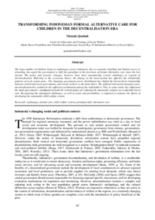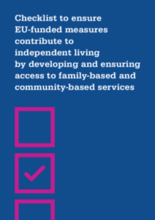Displaying 141 - 150 of 667
This video from World Without Orphans tells the story of Anu, who was abandoned as an infant and grew up in a large institution in India, later opening her own home for orphaned and abandoned girls. Anu came to realize that this was not the best way to care for the children and began, instead, to work within the community to provide education, food, medical care, and a way for children to remain in families.
This article describes the challenges in changing policy and practice in the provision of formal alternative care in Indonesia.
The purpose of this checklist from the European Expert Group on the transition from institutional to community-based care, with Hope and Homes for Children, is to ensure EU funds in the 2021-2027 programming period contribute to independent living and inclusion in the community, including by supporting desk officers to check the consistency of the measures to transition from institutional to family-based and community-based services for children and the prevention of institutionalisation and separation of children, including with disabilities, from their families.
This research is based on a stock-taking of the current situation. It is based on a comprehensive literature review and a genuine primary research with service users as well as policy makers, service providers, children and families.
This country care review includes the Concluding Observations of the Committee on the Rights of the Child and the Committee on the Rights of Persons with Disabilities. The Committees' recommendations on the issue of Family Environment and Alternative Care, and other care relevant issues, are highlighted.
The aim of this module from the book Rights-based Integrated Child Protection Service Delivery Systems is to learn to place children in specific alternative childcare services.
In this two-part video series, Nou Dalin, part of the social work team with Cambodia Children's Trust (CCT), discusses her experience of working in partnership with the Department of Social Affairs, Veterans and Youth Rehabilitation (DoSVY) to implement the Ministry of Social Affairs, Veterans and Youth Rehabilitation (MoSVY) Action Plan on Improving Childcare in Battambang Province in Cambodia.
In this video, Sreyna and Chenda, two practitioners from Hagar Cambodia, discuss their learning regarding the impact of the care setting on child rehabilitation.
In this video, Dy Noeut and Kim Malin of New Smile Organisation (NSO) discuss their experience of conducting family tracing as a part of reintegration efforts in the context of an unregistered orphanage where children’s files contained missing and inaccurate information.
Set in Central Region Ghana, using Country-Side Children’s Welfare Home (CCWH) as the main case study, this thesis investigates the underlying factors that are preventing families in the Bawjiase and surroundings from opening their homes and hearts to vulnerable children.




